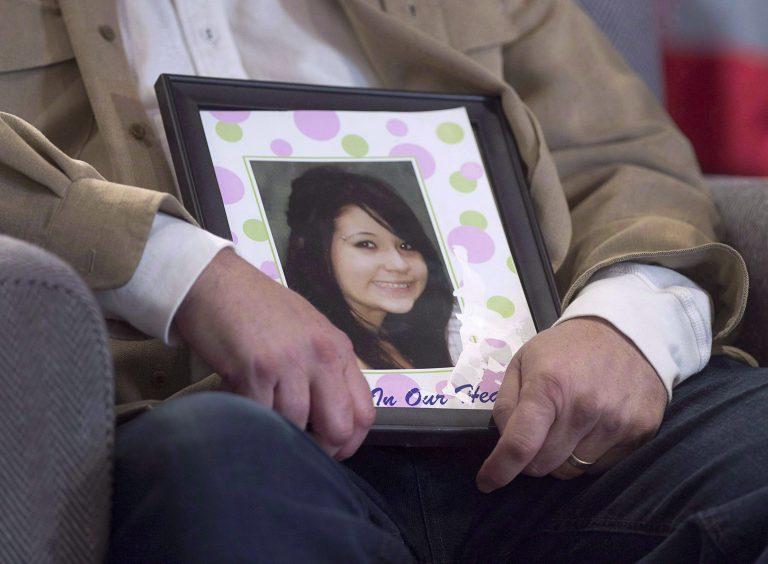‘A national tragedy’
Politics Insider for June 4: A day of symbolism, MMIW recommendations and so many minority governments

A photo of Hilary Bonnell is seen as Pam Fillier and her husband Fred Fillier appear at the National Inquiry into Missing and Murdered Indigenous Women and Girls in Moncton, N.B. on Tuesday, Feb. 13, 2018. (Andrew Vaughan/CP)
Share
Welcome to a sneak peek of the Maclean’s Politics Insider newsletter. Sign-up at the bottom of the page to get it delivered straight to your inbox.
‘Real people’: When the National Inquiry into Missing and Murdered Indigenous Women and Girls released its final report in Gatineau, Que. on Monday, the bombshell language was always going to draw most of the attention. The 1,200-page report called the thousands of incidents of often-fatal violence “nothing less than the deliberate, often covert campaign of genocide. This is not what Canada is supposed to be about; it is not what it purports to stand for.” Yet the event itself was imbued with collective and personal symbolism, writes Shannon Proudfoot:
Everywhere you looked, t-shirts and homemade placards spoke for the family members who had come to listen: favourite snapshots transformed into desperate missing posters, birth and death dates that occurred far too close together, smiling women and girls who together represented a national tragedy, but whose faces, when worn on the chest or clutched in the hands of people who loved them became once again who they were: real people.
They were too numerous, and in many cases, their fates were so bureaucratically overlooked as to be uncountable, the report concluded. (Maclean’s)
Recommendations: The report contains more than 200 recommendations. Among them were several that relate directly to a flashpoint issue in areas where resource extraction projects are underway or planned, writes Kyle Edwards—work camps, and the risk they pose to Indigenous women:
“There is substantial evidence,” the final report says, “of a serious problem that requires focused attention on the relationship between resource extraction projects and violence against Indigenous women.” The impacts on women and girls, the report explains, has never been a part of the decision-making process when it comes to deciding the fate of projects in northern B.C., particularly around the city of Fort St. John. “Moreover, even though most companies have sexual harassment policies,” the report says. “It is not clear that these policies are being consistently implemented in a meaningful way.” (Maclean’s)
Minority report: Canada is awash in minority governments. There are four provinces with governments in a minority position, an all-time high, according to CBC poll analyst Éric Grenier—the last time there were even three simultaneous minority governments was in 1971-72. It’s a sign Canada has joined the global moment of political disruption, writes Grenier, and the next federal election could be caught in the upheaval. (CBC News)
From fill up to beer up: ‘Hey, you know what would be great—let’s all go to our local convenience stores and act like we can’t find beer on the shelves that was never there,’ apparently said the social media director of Doug Ford‘s Ontario PCs to MPPs across the province. ‘After all, it worked so great with the gas stations.’ (Maclean’s)
Yay for us: Lastly, excuse us if we toot our own horn for a moment. On Friday night the National Magazine Awards gala was held in Toronto and Maclean’s came away with four huge wins, more than any other magazine:
- Gold, for our cover that shone a light on Canada’s persistent pay-equity gap, and charged two different newsstand prices to men and women to reflect that gap
- Gold for our oral history of the tragic Humboldt bus crash, which saw on-the-ground reporters coordinating with each other, and editors, as they brought the story to life after painful conversations with those closest to the victims; and
- Gold for our 100-page commemorative issue to mark the end of the First World War, which featured more than 66,000 individual covers that paid tribute to every fallen Canadian—and sparked countless conversations with readers about their loved ones.
- Top magazine editor of the year went to Maclean’s editor-in-chief Alison Uncles. (Maclean’s)